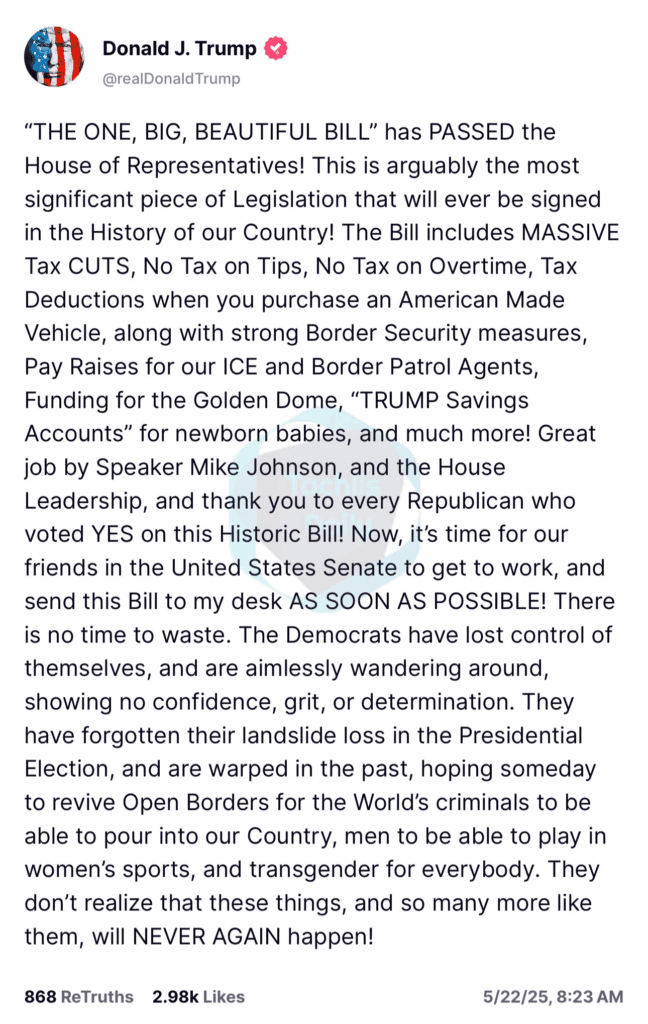In a pivotal early morning vote, the House of Representatives passed President Donald Trump’s sweeping tax and spending legislation known as the “One Big Beautiful Bill Act,” a comprehensive package that reshapes the nation’s tax code, public assistance programs, and education policy. The vote, 215-214, followed hours of intense overnight debate and revisions designed to rally the divided Republican caucus behind one of the administration’s most ambitious legislative efforts to date.
The legislation carries forward Trump’s campaign promises with a mix of tax relief, fiscal conservatism, and expanded national defense investments. It extends $4.5 trillion in tax cuts from Trump’s first term and introduces new cuts including eliminating taxes on tips, overtime pay, car loan interest, and Social Security income. The standard deduction for joint filers would rise to $32,000, and the child tax credit would increase by $500.
A centerpiece of the bill is its transformative school choice provision, modeled after successful programs in over 20 states. The Educational Choice for Children Act establishes a $5 billion annual scholarship initiative through a dollar-for-dollar federal tax credit to donors who support Scholarship Granting Organizations. These organizations would fund K-12 education expenses, including tuition for nonpublic schools such as yeshivas. Agudath Israel of America praised the inclusion, calling it “game-changing federal school choice legislation” and expressing hope for its full passage in the Senate.
The bill also proposes a wide overhaul of social services. Medicaid recipients would need to meet new work requirements—80 hours per month for able-bodied adults without dependents—starting in 2029. States would be required to verify eligibility twice annually and deny benefits to individuals owning homes valued over $1 million. SNAP benefits would be revised to require states to cover 5% of benefit costs and 75% of administrative expenses, a significant shift from current arrangements.
Defense spending features prominently in the bill, allocating nearly $150 billion for national security. This includes $25 billion for the development of a missile defense system dubbed the “Golden Dome for America,” $34 billion for shipbuilding to expand the naval fleet, and $5 billion for border security initiatives. A $12 billion fund would also reimburse states assisting in immigration enforcement.
Another significant component is the proposed revamp of federal student loan programs. The bill consolidates repayment options into two plans—one standard, the other a less generous income-based option—and repeals Biden-era forgiveness protections for defrauded borrowers. These changes aim to generate $330 billion in savings.
New energy provisions open public lands for increased drilling, mining, and logging while reducing royalty rates. A controversial late amendment also authorizes the sale of large tracts of public land in Nevada and Utah. Environmental groups have criticized these moves as a retreat from climate progress.
Immigration policy sees a stark shift under the bill, with provisions aimed at removing 1 million immigrants annually and detaining up to 100,000. It imposes a $1,000 application fee for asylum seekers and creates financial incentives for voluntary self-deportation.
Additional changes include boosting the state and local tax (SALT) deduction to $40,000 for families earning up to $500,000 and investing $60 billion in agriculture. The bill also establishes “Trump” savings accounts for children, offering federal seed contributions and allowing families to build tax-advantaged funds for future education or homeownership.
As the bill moves to the Senate, further revisions are expected. Supporters call the legislation a bold step toward restoring economic strength and individual opportunity. Critics, including most House Democrats and some Republican deficit hawks, warn of its long-term fiscal impact, estimating it will add between $3.3 and $3.8 trillion to the national deficit over ten years.














